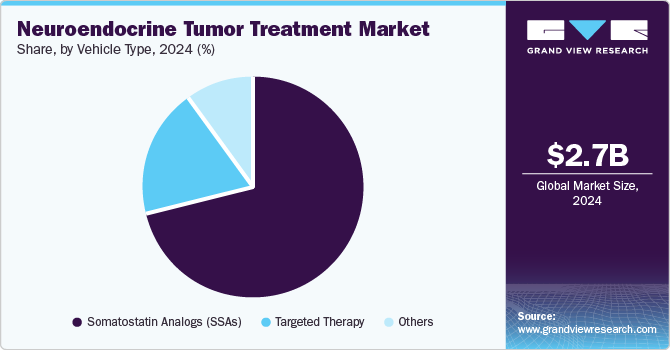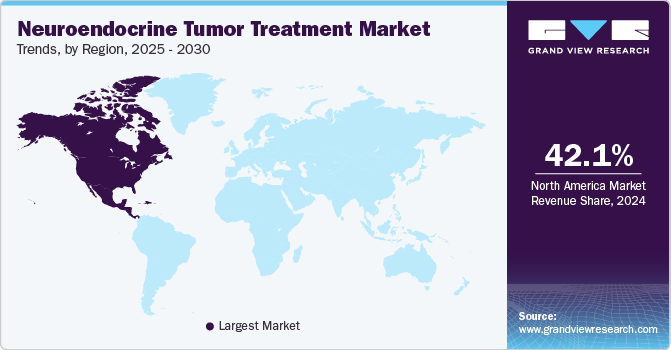- Home
- »
- Pharmaceuticals
- »
-
Neuroendocrine Tumor Treatment Market Size Report, 2030GVR Report cover
![Neuroendocrine Tumor Treatment Market Size, Share & Trends Report]()
Neuroendocrine Tumor Treatment Market Size, Share & Trends Analysis Report By Type (Meningiomas, Adrenal Cancer, Carcinoid Tumors, Paraganglioma), By Product, By Site, By End Use, By Region, And Segment Forecasts, 2025 - 2030
- Report ID: GVR-2-68038-624-0
- Number of Report Pages: 100
- Format: PDF, Horizon Databook
- Historical Range: 2018 - 2023
- Forecast Period: 2025 - 2030
- Industry: Healthcare
Market Size & Trends
The global neuroendocrine tumor treatment market was estimated at USD 2.66 billion in 2024 and is projected to grow at a CAGR of 6.0% from 2025 to 2030, primarily driven by the increasing prevalence of neuroendocrine tumors. As awareness of neuroendocrine tumors rises, more individuals are diagnosed each year, with over 12,000 new cases reported annually in the U.S., leading to increased demand for effective treatment options. This growing patient population demands advancements in the neuroendocrine tumor treatment industry to cater to their needs. The market is expected to benefit from innovative therapies and improved diagnostic techniques, further enhancing patient care and outcomes.

Another significant driver is the ongoing advancements in treatment modalities, particularly targeted therapies and novel drug formulations. Recent innovations such as Peptide Receptor Radionuclide Therapy (PRRT) have shown promise in treating late-stage neuroendocrine tumors with fewer side effects than traditional therapies. These advancements enhance treatment efficacy and improve patient outcomes, attracting investments into the neuroendocrine tumor treatment industry. Introducing new therapies broadens the available treatment landscape, making it essential for healthcare providers to adapt and incorporate these options into their practice.
Furthermore, increasing research and development (R&D) investment within the pharmaceutical sector is crucial to accelerating the neuroendocrine tumor treatment market. Companies are focusing on developing precision medicine approaches that tailor treatments to individual patient profiles, which can lead to better therapeutic outcomes. As R&D spending rises, it fosters innovation and accelerates the development of cutting-edge diagnostic tools and therapeutic options. This trend enhances healthcare professionals' capabilities and instills confidence in patients seeking advanced neuroendocrine tumor treatments.
Type Insights
The carcinoid tumors segment dominated the market with a revenue share of 24.3% in 2024, driven by the increasing prevalence of carcinoid tumors and advancements in treatment methodologies. As awareness of these tumors grows, more patients are being diagnosed and treated effectively, boosting the demand for specialized therapies. The development of innovative treatment options, including somatostatin analogs and targeted therapies, has significantly improved patient management in the neuroendocrine tumor treatment industry. In addition, ongoing research into the biology of carcinoid tumors is leading to better understanding and more effective therapeutic approaches, further propelling this segment growth.
The paraganglioma segment is projected to grow at the highest CAGR of 7.7% over the forecast period, fueled by increased research on rare neuroendocrine tumors and their unique treatment needs. As healthcare providers gain more insight into paragangliomas, there is a growing recognition of the need for tailored therapies that address the specific characteristics of these tumors. The rising incidence rates of paragangliomas also contribute to increased demand for effective treatment options within the neuroendocrine tumor treatment market. Moreover, advancements in diagnostic technologies enable earlier detection, allowing for timely intervention that enhances patient outcomes.
Product Insights
The Somatostatin Analogs (SSAs) segment dominated the market with the largest revenue share in 2024, attributed to their proven efficacy in managing symptoms associated with neuroendocrine tumors. SSAs have become a cornerstone in treating various types of neuroendocrine tumors due to their ability to inhibit hormone secretion and slow tumor growth. The continuous development and approval of new SSA formulations enhance their effectiveness and accessibility within the neuroendocrine tumor treatment industry. Furthermore, increasing clinical evidence supporting their use drives greater adoption among healthcare providers, contributing to their market dominance.

The targeted therapy segment is projected to grow at a significant CAGR over the forecast period due to the shift toward personalized medicine focusing on specific tumor characteristics. This approach allows treatments to target the molecular pathways involved in neuroendocrine tumors, improving efficacy and reducing side effects. The introduction of novel targeted therapies expands the treatment landscape within the neuroendocrine tumor treatment market, making it an attractive option for patients seeking effective management strategies. As research continues to uncover new targets within these tumors, further innovations in targeted therapies are anticipated.
Site Insights
The small intestine segment dominated the market with the largest revenue share in 2024, attributed to the higher incidence rates of neuroendocrine tumors originating from this site. Small intestine neuroendocrine tumors often present unique challenges that require specialized treatment approaches, which has led to increased focus on this area within the neuroendocrine tumor treatment industry. Enhanced diagnostic capabilities have also improved detection rates, allowing timely and effective interventions. As awareness about these tumors increases among healthcare professionals and patients alike, demand for effective treatments continues to rise.
The stomach segment is projected to grow at the highest CAGR over the forecast period due to increasing awareness and improved diagnostic techniques for gastric neuroendocrine tumors. Enhanced imaging technologies facilitate earlier detection and more accurate diagnoses, which is crucial for effective treatment planning. As healthcare providers become more knowledgeable about stomach-related neuroendocrine tumors, tailored therapeutic strategies are likely to emerge, driving growth within this segment of the neuroendocrine tumor treatment market.
End-use Insights
The hospitals segment dominated the market with the largest revenue share in 2024, driven by the comprehensive care offered by hospitals for complex cases of neuroendocrine tumors. Hospitals provide a multidisciplinary approach that integrates surgery, chemotherapy, and supportive care services essential for managing these challenging conditions effectively. This integrated care model enhances patient outcomes and satisfaction within the neuroendocrine tumor treatment market. In addition, hospitals often have access to advanced diagnostic tools and technologies that facilitate timely interventions.
The clinics segment is anticipated to grow at the highest CAGR over the forecast period, which can be attributed to patients increasing preference for outpatient care models. Patients seek less invasive treatments that allow them to receive care without extensive hospital stays or disruptions to their daily lives. This trend reflects broader shifts in healthcare delivery towards convenience and accessibility, making clinics an attractive option for those seeking management of neuroendocrine tumors within the treatment market.
Regional Insights
North America neuroendocrine tumor treatment market dominated the global market with a revenue share of 42.1% in 2024, driven by high healthcare expenditure coupled with advanced medical infrastructure. The region's robust research environment fosters innovative treatment options while ensuring patients access to cutting-edge therapies tailored to neuroendocrine tumors. Increased awareness about these conditions among healthcare professionals and patients contributes significantly to market expansion.

U.S. Neuroendocrine Tumor Treatment Market Trends
The U.S. neuroendocrine tumor treatment market dominates North America, with a significant revenue share in 2024 due to a well-established healthcare system that supports extensive research initiatives. The presence of leading pharmaceutical companies and research institutions facilitates the rapid development and deployment of new therapies specifically designed for neuroendocrine tumors. This environment enhances patient access and drives competitive advancements within the neuroendocrine tumor treatment market.
Europe Neuroendocrine Tumor Treatment Market Trends
Europe neuroendocrine tumor treatment market held a substantial market share in 2024, driven by increased investment in healthcare infrastructure and research initiatives. European countries are focusing on improving diagnostic capabilities while expanding access to innovative treatments for patients suffering from neuroendocrine tumors. This commitment reflects a broader trend towards enhancing patient care quality across Europe’s healthcare systems as they adapt to rising incidence rates.
Middle East & Africa Neuroendocrine Tumor Treatment Market Trends
The Middle East & Africa neuroendocrine tumor treatment market is anticipated to achieve a CAGR of 11.2% during the forecast period, driven by increasing awareness of cancer treatments and enhancements in healthcare facilities. As countries in this region invest more in healthcare infrastructure, access to advanced therapies for neuroendocrine tumors is expected to improve significantly. This development will create opportunities for growth in the neuroendocrine tumor treatment market as more patients seek effective management options for their conditions. Enhanced diagnostic capabilities and the introduction of new treatment modalities will further support this growth, ultimately benefiting patient care across the region.
The Saudi Arabia neuroendocrine tumor treatment market dominates the Middle East & Africa with a significant revenue share in 2024 due to ongoing investments to modernize healthcare services. The focus on enhancing cancer care services has led to improved facilities and access to innovative treatments specifically targeting neuroendocrine tumors. This strategic emphasis on healthcare development positions Saudi Arabia as a regional neuroendocrine tumor treatment landscape leader as it expands its capabilities.
Key Neuroendocrine Tumor Treatment Company Insights
Some key companies operating in the market include Novartis AG, Bristol-Myers Squibb Company, Pfizer Inc., Boehringer Ingelheim International GmbH, and Hutchison MediPharma Limited. Companies are undertaking strategic initiatives such as mergers, acquisitions, and product launches, to expand their market presence and address the evolving healthcare demands through the neuroendocrine tumor treatment market.
-
Novartis AG offers innovative solutions in the neuroendocrine tumor treatment market, notably through Lutathera (lutetium Lu 177 dotatate), a radioligand therapy for somatostatin receptor-positive gastroenteropancreatic neuroendocrine tumors. In addition, Afinitor (everolimus) is also available for advanced nonfunctional neuroendocrine tumors of gastrointestinal and lung origin, contributing to improved patient outcomes in this specialized field.
-
Pfizer Inc. offers innovative treatments for Neuroendocrine Tumors (NET), particularly its product SUTENT (sunitinib malate), which has received FDA approval for advanced pancreatic NET. This oral multi-kinase inhibitor targets various molecular pathways involved in tumor growth and angiogenesis, significantly improving progression-free survival compared to placebo in clinical trials.
Key Neuroendocrine Tumor Treatment Companies:
The following are the leading companies in the neuroendocrine tumor treatment market. These companies collectively hold the largest market share and dictate industry trends.
- Novartis AG
- Bristol-Myers Squibb Company
- Pfizer Inc.
- Boehringer Ingelheim International GmbH
- Hutchison MediPharma Limited.
- AVEO Pharmaceuticals, Inc.
- Ipsen Pharma.
- Eli Lilly and Company.
- Exelixis, Inc.
- Jubilant Pharmova Limited
Recent Developments
-
In June 2024, Bristol-Myers Squibb Company announced that the combination of Opdivo (nivolumab) and Yervoy (ipilimumab) significantly improves overall survival for patients with advanced hepatocellular carcinoma compared to lenvatinib or sorafenib, as shown in the CheckMate-9DW trial. The results indicate a median overall survival of 23.7 months for the Opdivo/Yervoy combination versus 20.6 months for the other treatments, with a favorable safety profile.
-
In April 2024, Novartis AG received FDA approval for lutetium Lu 177 dotatate (Lutathera) for pediatric patients aged 12 years and older with somatostatin receptor-positive Gastroenteropancreatic Neuroendocrine Tumors (GEP-NETs). The approval was based on data from the ongoing NETTER-P study, which evaluated the pharmacokinetics and safety of Lutathera in adolescents, demonstrating a safety profile similar to that observed in adults.
Neuroendocrine Tumor Treatment Market Report Scope
Report Attribute
Details
Market size value in 2025
USD 2.79 billion
Revenue forecast in 2030
USD 3.73 billion
Growth rate
CAGR of 6.0% from 2025 to 2030
Base year for estimation
2024
Historical data
2018 - 2023
Forecast period
2025 - 2030
Quantitative units
Revenue in USD billion and CAGR from 2025 to 2030
Report coverage
Revenue forecast, company ranking, competitive landscape, growth factors, trends
Segments covered
Type,product, site, end use, region
Regional scope
North America; Europe; Asia Pacific; Latin America; Middle East & Africa
Country scope
U.S., Canada, Mexico, UK, Germany, France, Italy, Spain, Norway, Denmark, Sweden,Japan, China, India, South Korea, Australia, Singapore, Brazil, Argentina, South Africa, Saudi Arabia, UAE, Kuwait
Key companies profiled
Novartis AG; Bristol-Myers Squibb Company; Pfizer Inc.; Boehringer Ingelheim International GmbH; Hutchison MediPharma Limited.; AVEO Pharmaceuticals, Inc.; Ipsen Pharma.; Eli Lilly and Company.; Exelixis, Inc.; Jubilant Pharmova Limited
Customization scope
Free report customization (equivalent up to 8 analysts working days) with purchase. Addition or alteration to country, regional & segment scope.
Pricing and purchase options
Avail customized purchase options to meet your exact research needs. Explore purchase options
Global Neuroendocrine Tumor Treatment Market Report Segmentation
This report forecasts global, regional, and country revenue growth and analyzes the latest industry trends in each sub-segment from 2018 to 2030. For this study, Grand View Research has segmented the global neuroendocrine tumor treatment market report based on type, product, site, end use, and region:
-
Type Outlook (Revenue, USD Billion, 2018 - 2030)
-
Meningiomas
-
Adrenal Cancer
-
Carcinoid Tumors
-
Paraganglioma
-
Pheochromocytoma
-
Others
-
-
Product Outlook (Revenue, USD Billion, 2018 - 2030)
-
Somatostatin Analogs (SSAs)
-
Targeted Therapy
-
Others
-
-
Site Outlook (Revenue, USD Billion, 2018 - 2030)
-
Lung
-
Pancreas
-
Colon
-
Small Intestine
-
Rectum
-
Stomach
-
Others
-
-
End Use Outlook (Revenue, USD Billion, 2018 - 2030)
-
Hospitals
-
Clinics
-
Others
-
-
Regional Outlook (Revenue, USD Billion, 2018 - 2030)
-
North America
-
U.S.
-
Canada
-
Mexico
-
-
Europe
-
UK
-
Germany
-
France
-
Italy
-
Spain
-
Norway
-
Denmark
-
Sweden
-
-
Asia Pacific
-
Japan
-
China
-
India
-
South Korea
-
Australia
-
Singapore
-
-
Latin America
-
Brazil
-
Argentina
-
-
Middle East & Africa
-
South Africa
-
Saudi Arabia
-
UAE
-
Kuwait
-
-
Share this report with your colleague or friend.
![gvr icn]()
NEED A CUSTOM REPORT?
We can customize every report - free of charge - including purchasing stand-alone sections or country-level reports, as well as offer affordable discounts for start-ups & universities. Contact us now
![Certified Icon]()
We are GDPR and CCPA compliant! Your transaction & personal information is safe and secure. For more details, please read our privacy policy.
We are committed towards customer satisfaction, and quality service.
"The quality of research they have done for us has been excellent."





